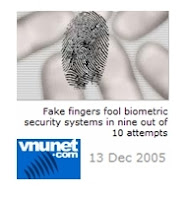 In 2006 US Ohio security firm CityWatcher.com raised eyebrows when it requested that some of its employees be “chipped,” or implanted with grain-size subcutaneous RFID tags for access to certain rooms – a sort of high-tech key. According to published reports, only two employees got the implants before the company dropped the programme. CityWatcher.com has since shut down.
In 2006 US Ohio security firm CityWatcher.com raised eyebrows when it requested that some of its employees be “chipped,” or implanted with grain-size subcutaneous RFID tags for access to certain rooms – a sort of high-tech key. According to published reports, only two employees got the implants before the company dropped the programme. CityWatcher.com has since shut down.Elsewhere in the US, Alzheimer’s patients have been implanted with the tiny tracking devices.
Now California is taking the bizarre step, already taken by two other US States, to have to ban the human implanting of these chips without a person’s consent!
Unlike Global Positioning System (GPS) technology, which is used for constant, real-time tracking, RFID tags are scanned at close range – usually from a few feet to a few inches. The tags are tracked by scanners installed at checkpoints, such as office doors or warehouse loading docks. The systems are also commonly used in highway toll collection and as theft protection in car keys.
A May 2006 story in Wired Magazine featured Jonathan Westhues, a 24-year-old engineer who demonstrated how he could (and did) covertly scan a company’s RFID employee badge and break into the office – all with a cheap, homemade reader. He’s since posted detailed instructions on how to make the reader on his Web site. Mr. Westhues likens RFID chips to “a repurposed dog tag”.
RFID will be addressed in detail during the new ARC Course Specifying Security Technology, 18-22 August 2008.
For the full story on the US debate on subcutaneous RFID implants go to:
http://www.centralvalleybusinesstimes.com/stories/001/?ID=6398
or put the kettle on, make a cup of tea and Google "subcutaneous RFID"!




















 Terrorists may resort to non-conventional means such as biological weapons or materials. Some of these materials have the capacity to infect thousands of people, contaminate soil, buildings and transport assets, destroy agriculture and infect animal populations and eventually affect food and feed at any stage in the food supply chain. The risk of "bioterrorist" attack has been statistically low but its consequences can be devastating.
Terrorists may resort to non-conventional means such as biological weapons or materials. Some of these materials have the capacity to infect thousands of people, contaminate soil, buildings and transport assets, destroy agriculture and infect animal populations and eventually affect food and feed at any stage in the food supply chain. The risk of "bioterrorist" attack has been statistically low but its consequences can be devastating.






 The unique security training partnership between ARC Training and Orange Group a.s. in Prague is set to enter its second year, with plans to expand the range of security management training in the Czech language.
The unique security training partnership between ARC Training and Orange Group a.s. in Prague is set to enter its second year, with plans to expand the range of security management training in the Czech language.

















